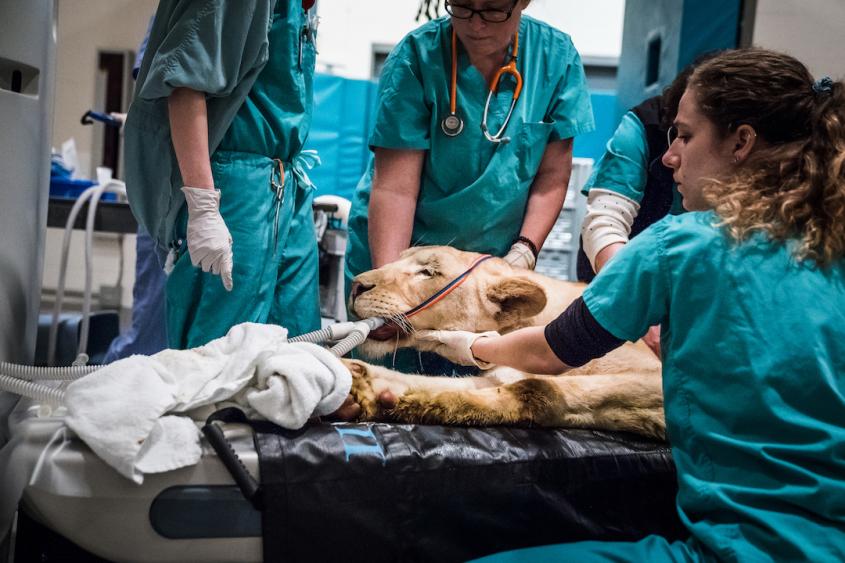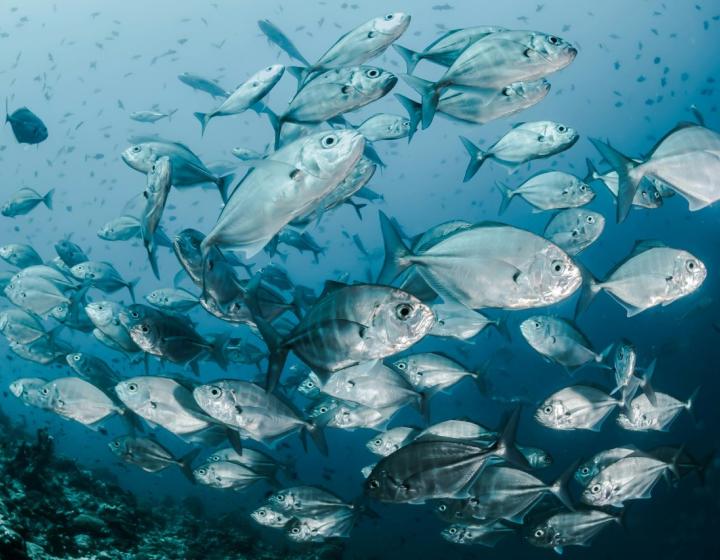Lioness’ surgery at Cornell is roaring success
LionessEdits2020-98.jpg

Ntsumi, who weighs over 200 pounds, had an inconsistent appetite and short bouts of lethargy. Photos and video by Darcy Rose/Cornell Vet.
A big cat got the lion’s share of attention when her keepers brought her to the Cornell University Hospital for Animals (CUHA). There, Ntsumi the white African lioness was diagnosed with an intestinal mass that veterinarians surgically removed.
“While the diagnostic tests and surgery we performed were routine, the size and species of this animal made it challenging and unique,” said Dr. Noha Abou-Madi, associate clinical professor of zoological medicine.
The lioness’ keepers at Animal Adventure Park noticed she wasn’t acting like herself. Ntsumi, who weighs over 200 pounds, had an inconsistent appetite and short bouts of lethargy.
“Ntsumi has always been a relatively agreeable animal, eager to work with her keepers, and confidently the dominant female over our other lioness, often relaxing alongside Solomon, the male white African lion,” said Jordan Patch, owner of Animal Adventure Park. “What made everything a bit harder to track, trace or identify was that after a day or so of discomfort, Ntsumi would be back to herself — playing among the others and consuming all of her food.”
After observing her and providing medical care, the park’s veterinary team referred Ntsumi to Cornell. There, Abou-Madi reviewed Ntsumi’s previous medical record and lab work. Together with licensed veterinary technician Samantha Koba, she planned a schedule where specialists from key services at the hospital would be ready and available to help during the unusual visit, including anesthesiologists, radiologists, dentists, small animal surgeons and internists.
“For us in the section of zoological medicine, we work with wild species every day,” said Abou-Madi, “and in the past, we have had a few tigers, bears and other lions at CUHA for advanced diagnostics, but this is still an unusual situation.”

Erin Lien, Animal Adventure Park’s curator, transported Ntsumi 60 miles from Harpursville, New York, to Ithaca without incident. The lioness announced her arrival with roars and growls from within a metal crate specially designed for transporting large carnivores.
“We made sure that upon arrival, she was placed in a quiet and secure room,” Abou-Madi said. “The visual examination was very limited by the crate, and so we safely performed the complete physical examination once she was anesthetized.”
While clinicians prepared Ntsumi for a CT scan and diagnostic tests, they felt a large, hard mass in her abdomen. The scan confirmed this as the culprit of her symptoms: a mass impacting her small intestine. Ntsumi was immediately prepped for emergency surgery. Left untreated, the mass could result in Ntsumi's death.
“While intestinal obstructions have been reported in large cats, they are not common,” said Abou-Madi. The movement of the mass inside Ntsumi’s intestines accounted for her inconsistent behavior, resulting in good or bad eating and energy days.

Dr. Galina Hayes, assistant professor of small animal surgery, successfully removed the mass, which comprised bone, hay and hair. Cornell veterinarians concluded that otherwise, Ntsumi was a young lioness in excellent condition.
Back home at Animal Adventure Park, Ntsumi recovered in a smaller holding area to prevent infection and excessive play, which can disrupt the sutures used to close the wound.
“Almost immediately, Ntsumi’s consumption rates returned to normal levels, her activity and response was baseline and she very much wanted to rejoin Solomon and Bisa,” said Patch. “The lionesses greeted one another with open paws, and without issue. Solomon was a bit cautious after her time away, but under the supervision of keepers and park veterinary teams, that introduction process has been going quite well with monitored, shared space play times.”
African lions are classified as a vulnerable species whose populations are dwindling due to loss of habitat, poaching and disease. White lions like Ntsumi are rare, their color caused by a recessive trait of the same gene responsible for albinism.
“The uniqueness of Ntsumi and Solomon brings further conversation with guests during daily keeper talks, discussing genetics, the rarity of the white line, the debate of two species versus one and the protections that would be afforded to the white lion, if it were reclassified,” Patch said. “As a facility that exhibits lions, it is our responsibility to do much more than fill a space, feed and clean. It is our job to create conversation, engage guests, bring critical thinking and inspire park goers to do more for their planet and the animals that, with us, call it home.”
Said Abou-Madi, “From the professional and supportive care she receives at Animal Adventure Park to the remarkable expertise of the clinicians, staff and students at CUHA, Ntsumi was in the best hands from start to finish.”

By Melanie Greaver Cordova




